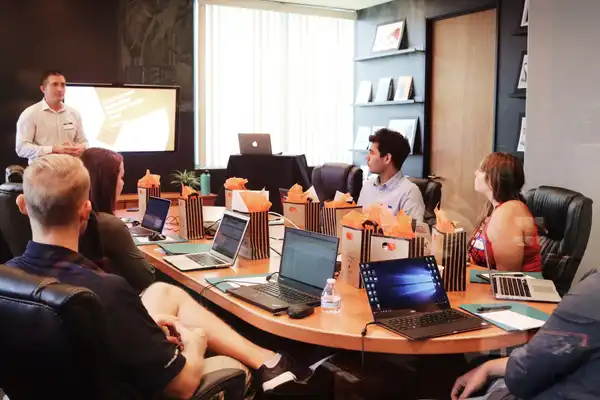‘The Whole Process Sucked!’ - Progressing From Manual Tests to Automated Tests with Alooba

Cole Brickley heads up the analytics consulting function at Avicado, who specialise in analytics & technology in the construction industry. Avicado empowers construction owners to leverage their systems and data. Their experts partner with enterprise organizations like data centers, universities, hospitals and developers to create seamless interoperability across their teams and technologies. They do this through both their E-Builder enterprise software offering, and analytics consulting on top.

Navigating startup growing pains
When Brickley joined Avicado, they were a small but promising startup with 15 people, and a data team of 2. But business was growing quickly for Avicado and with demand for their services soaring, Brickley needed to start building out a team of data consultants.
From the get-go, Brickley understood the importance of ensuring his candidates had the right skills for the role. Nothing is as demoralising in the early days than getting the hire wrong. A bad hire is a pain in the neck in a large organisation, but in a startup, it can have a potentially catastrophic impact on the small team’s morale.
While reducing bias and running an objective hiring process were important for Brickley, ultimately it was about hiring the right people, as easily as possible. Like a lot of Alooba clients, Brickley was being let down by a lack of technology to support hiring effectively.
He had to hack together his own take-home assignments, which were insightful and gave him a reasonable understanding of the candidate’s skills, but just unscalable in so many ways as Brickley explains:
How can you accurately assess somebody's technical skills, like the same way across the board, right? We had devised a Tableau-based assessment. So it wasn't like a past/fail. It was kind of like, hey, what do they send us? Does it look decent? Did they understand the data or the values that they're showing accurate? Where we'd say, here's a data set, here's the credentials to access the data set. And it just wasn't really a scalable way to assess technical - just administering it, all of it was manual, but the whole process sucked, right?
Acheiving consistency & avoiding bias is pretty much impossible with take-home tests. With Alooba, the assessments are structured, timed and monitored, so each candidate gets measured in the same way. The result? A clear apples-for-apples comparison. Check out our comparison of Alooba Assess vs DIY take-home tests for more info.

Are your consultants billing clients or grading tests?
Brickley goes on to explain the massive cost he had in running recruitment. Rather than focusing on building the practice and being 100% billable, Brickley found himself wasting precious billable hours, mucking around administering and grading the tests he’d hacked together himself.
We interviewed somebody who looked, okay, we like you. All right, we want you to take a technical assessment. All right, now I need to send you an email. I need to go into BigQuery and give you access. I need to make sure you can access the data. Some people didn't have Tableau, so I'd say, all right, you can go get a free trial if you haven't already, go download it.
Brickley also realised that even once candidates have access to the assessment, they might not necessarily complete it, or complete it on-time. Candidates are going to need a nudge, which again was just more manual effort, chewing into precious time.
So there's a fair bit of handholding through the process, and then once they submitted their technical assessment, there was the element of saying, hey, this is your due date, make sure to hit it. If they didn't, you'd have to go follow up and then they'd send it over. And then you finally get it.
With Alooba you can automate away a lot of the these timesucks:
- Candidates can be invited in 1 click
- Candidates receive automated reminders & nudges to maximise the attempt rate
- Assessments are automatically graded
With time of the essence in a fast-paced consultancy environment, Brickley was happy to take the wins and reclaim some precious time to invest in clients instead.
It definitely eliminated candidates that otherwise would likely have made it further along in the interview process based on just their resume - I'd call that a win because the more interviews we do, the more time it takes. If I'm doing that work grading technicals, yeah certainly not billable work!


Opening up a new set of candidates
Brickley found that once they’d achieved the automation & scalability he was hoping for, this then meant he could screen-in new candidates. The Avicado hiring process was no longer limited to how many Tableau assignments could be graded in spare time - that was now all automated, allowing them to now assess all their candidates, one step earlier in the process.
Whereas when we implemented Alooba, I was like, hey, we're gonna bump that all the way up to the second step in the process and use it kind of as a screener, so if you don't pass the Alooba assessment, you don't move on in the interview stage.
By measuring all candidates, Avicado were able to ensure every candidate was given a fair opportunity, irrespective of what was on their CV. With CVs typically revealing a candidate’s race, religion, gender & age, this was a big step forward in their hiring fairness and combating bias!

The ultimate signal of on-the-job performance
Validating candidates’ skills was essential to Brickley. But ultimately, it’s about getting results. Would his new hires actually be able to perform? Did their strong test score correlate with their actual performance?
I can say that the people that have scored the highest on the assessment have technically been the best people we hired. So I know, like Abby, scored the highest on one of our early assessments. She came in and just kicked ass. And then our most recent high-scorer, Nick, yeah, he's just crushing it, hit the ground running, getting great feedback from everybody he's working with.

Are you considering creating your own test? It’s easy to see how it might be easier initially, but the cost of complexity adds up very quickly. Check out a full comparison of Alooba Assess vs creating your own test.


